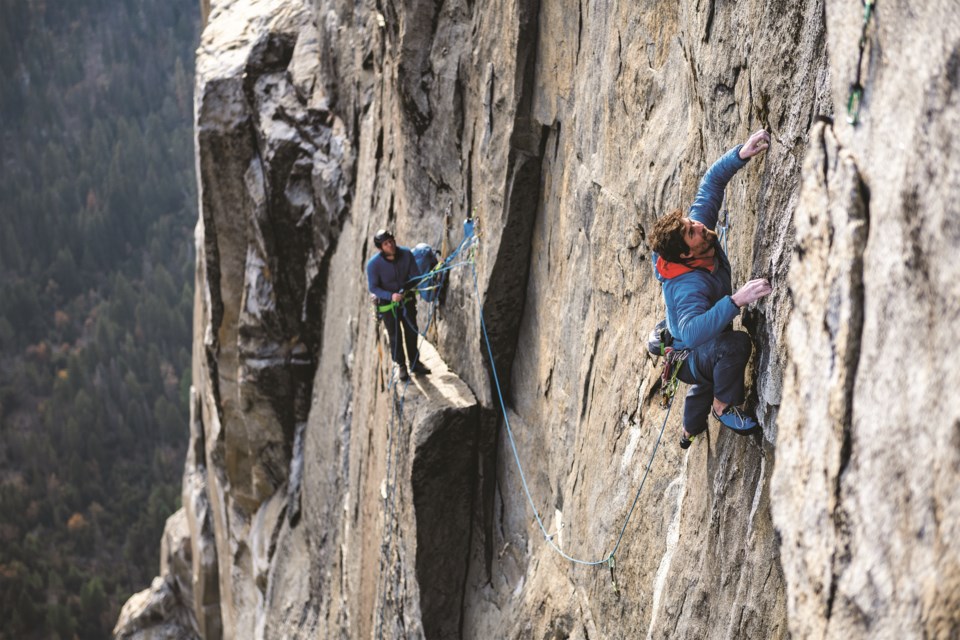Rock climbing is one of those sports that when you hit a certain level, things can get rather intimidating. The first time I ever lead climbed on “trad gear” (placing removable fall protection on the rock as you climb) I was terrified, the consequences of falling suddenly getting all the more real. What surprised me during this stressful foray into trad climbing was the amount of strength and focus I didn’t know I had. But that strength and focus had a limit, my risk tolerance overriding my desire to push into bigger, harder climbs.
When I watch climbing documentaries about Alex Honnold (Free Solo) or the late Marc-André Leclerc (The Alpinist), I don’t really see much of myself in these athletes. Their skill, work ethic, and tolerance of risk seem almost otherworldly. When you see these men getting interviewed on camera, their mannerisms and perspectives paint them as a different type of human altogether.
That wasn’t the case when I read Sonnie Trotter’s new book Uplifted: The evolution of a climbing life. For those not familiar, Trotter is a Canadian professional climber who has spent his 30-year career contributing to hundreds of first free ascents around the world (free ascent is climbing a wall without any artificial aid, not to be confused with free solo ascent, which is climbing without any protection at all and what Honnold and Leclerc are known for). Trotter’s list of accomplishments rival any climber in the sport, but his story of getting there is one that is so much more relatable. From growing up in Newmarket, Ont., and finding his place at a local climbing gym as a restless teenager, to making the difficult decision to turn around on what might end up being a once-in-a-lifetime climbing opportunity, the tales of his life in Uplifted seem all the more, well, human.
The part of Trotter’s story I related to most was his period of going “all in” on his climbing career. Twenty-three years old and banging nails up to 14 hours a day to fund the next climbing trip, when cashing a paycheck Trotter was asked by his bank if he was interested in taking out a line of credit for $20,000. While the idea of being indebted was scary, the opportunity it represented was far more powerful. A month later, Trotter quit his job, withdrew half his credit limit and bought a van. Filling the vehicle with his climbing pack, a duffle of wrinkly clothes, a cheap sleeping bag and enough canned food and pasta to feed him for a month, Trotter pointed his wheels towards Colorado and embraced a new type of climbing freedom.
While I’ve never gone full van-life with the aim of climbing every day, committing to a modest mountain lifestyle requires a similar leap. You could probably make more money pursuing a career back in your hometown or a big city, but the opportunity to live with adventure on your doorstep—every single day—is one that’s simply too good to pass up. For Trotter, that line of credit let him focus solely on climbing for the next year to see if he could make this adventurous lifestyle work, and maybe even scrape through with a career as a pro climber.
“Fuck it,” he wrote in Uplifted. “I knew what I was doing—even if the bank didn’t. I was determined to live the life I had always dreamt of, to climb every day, to meet like-minded people, and to experience as many new routes and rock types as my time on this planet would allow. Nothing else mattered.”
Those first 18 months led to Trotter’s first real recognition for his pioneering climbs. It also led to conversations with the outdoor brand Patagonia and eventually a career-long partnership. Since then, Trotter unlocked new free ascent routes everywhere from Squamish and the Canadian Rockies to Mexico’s Cascada de Basaseachi National Park. He has climbed with the world’s best athletes, written stories about truly exotic locations (with photos to match, many of which appear in his book) and perhaps most impressively, has managed a successful pro-climbing career while prioritizing family life with two children. In a sport where climbers and mountaineers often perish in the pursuit of greatness, Trotter’s approach to risk in the mountains has evolved with his experience.
Does Uplifted make me want a send a 5.13? Not really. I know what I’m capable of and I don’t need that level of stress. But the book does make me want to dust off the climbing shoes and feel the freedom of rock climbing again.
Well done, Sonnie.
Uplifted: The evolution of a climbing life is published by Patagonia and is now available in hardcover. For questions, comments or suggestions for The Outsider, email [email protected] or Instagram @whis_vince.




